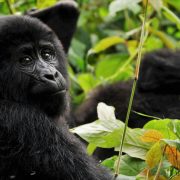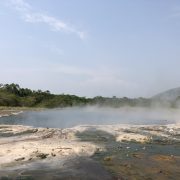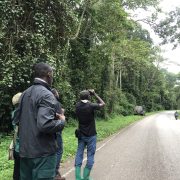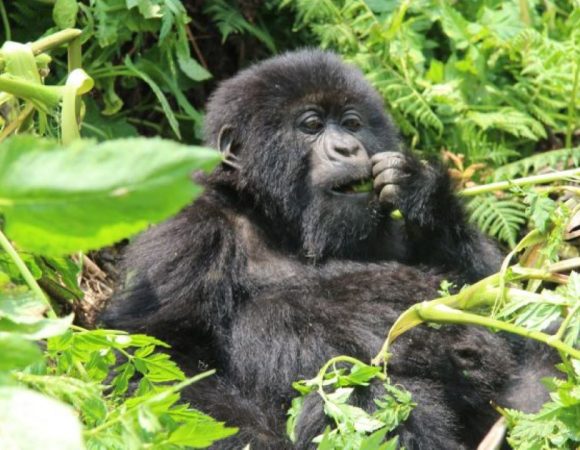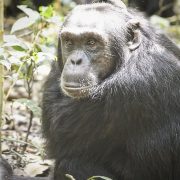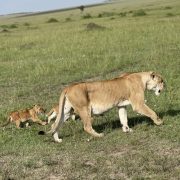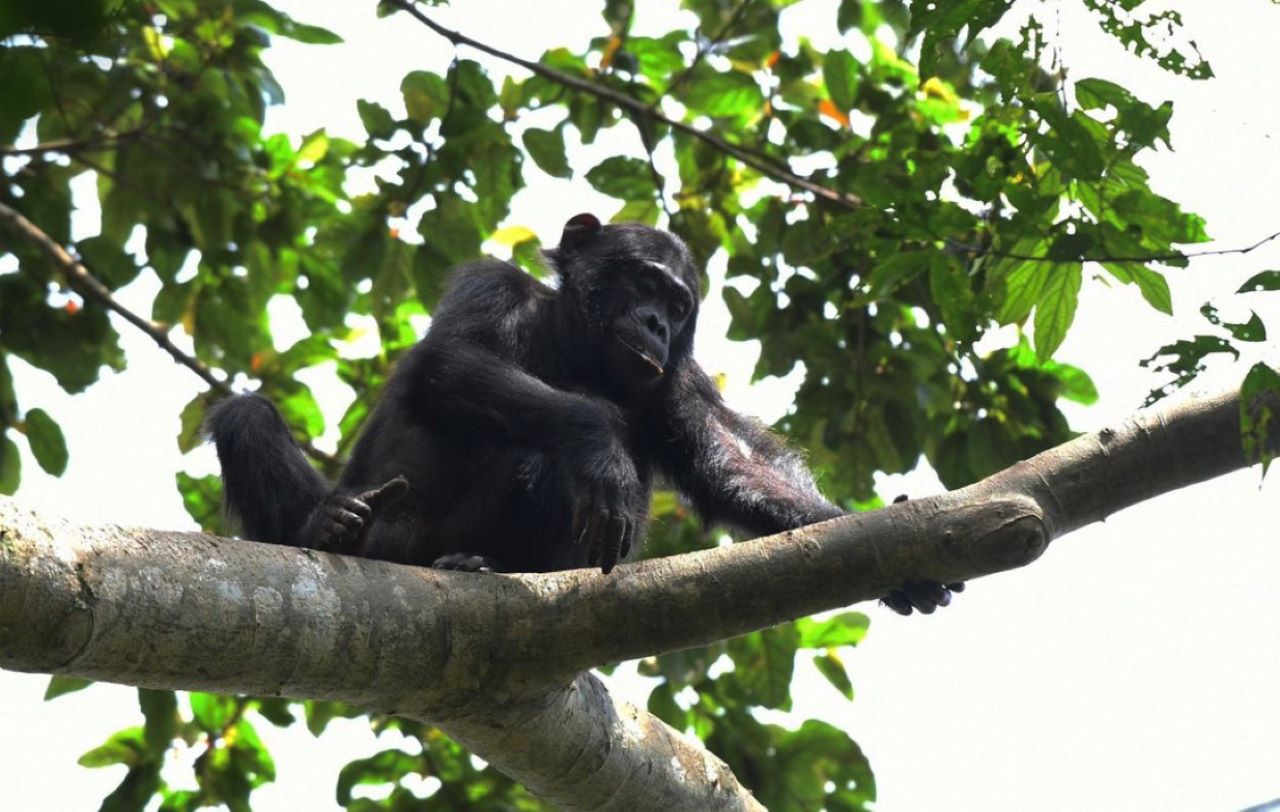
Chimpanzee Trekking in Rwanda : where to see chimps in Rwanda, chimpanzee tours
Chimpanzee trekking in Rwanda is one of the prime and top tourist activities to do while in Rwanda. Chimpanzee trekking is a worthwhile wildlife adventure that brings one closer to the chimpanzees and offers one an opportunity to watch these active primates in Nyungwe Forest. Chimpanzee tracking is done in Nyungwe Forest National Park which is one of Rwanda’s finest parks which offers incredible wildlife experiences. Nyungwe is a park rich in bio-diversity and a key attraction in Rwanda.
Nyungwe Forest is one of Africa’s oldest rain forest and aside from being home to the Chimpanzees, Nyungwe Forest is home to other primates like the Black-and-white colobus monkeys, Red-tailed monkeys, L’Hoest’s monkeys. About 13 species of primates have been recorded at Nyungwe National Park making it a prominent primate tracking destination in Rwanda. Nyungwe National Park is the best place to see chimps in Rwanda and the best place to do Chimpanzee tracking in Rwanda, about 600 chimpanzees have been recorded at the park.
Nyungwe is the largest forest in Rwanda and is characterized by bamboo covered slopes, dense Afro-montane forest, grasslands and wetlands, the park was recently designated a World Heritage site by the United Nations Educational, Scientific and Cultural Organization (UNESCO) in September 2023. The forest is a diverse attraction with 200 orchids, 1,o50 plant species, 38 reptile species, 85 mammal species, 32 amphibian species and about 120 butterfly species. Nyungwe is also a rewarding destination while birding in Rwanda as about 310 species of birds have been recorded at the park.
Information about Chimpanzees
Chimpanzees are commonly known as man’s closest relatives as they have 98% of our DNA and are rather active primates compared to the gorillas. Chimpanzees live in large multi-female and multi-male communities and chimpanzees are highly territorial primate species hence protecting their territories with aggression and constant boundary patrols in the forest. On a lucky day while chimpanzee trekking one group might come across a chimp community with chimp juveniles. Chimpanzee infants are very close to their mothers and are usually seen with their mothers as they spend the first 4-6 months of their life under their care. Chimpanzee mothers though continue to have influence on their off springs even after the infancy period and the chimpanzees often travel with their mothers for an additional four to five years. Chimpanzee communities vary in size where by some communities can have fewer than 20 individuals while others can have over 200 individuals in one community.
Chimpanzees mainly feed on ripe fruits and 60-70 % of their diet comprises of fruit, in addition to fruits chimpanzees feed on leaves, nuts and pith. Although their diet mainly consists of fruit chimpanzees also hunt down small primates like the red colobus monkeys for meat in their respective communities. Chimpanzees are very social primates and tend to have their own unique ways of communicating through gestures, unique sounds and hand movements. Their way of communication is important for their survival in the forest as different sounds are made by the chimps to warn others in case there is danger ahead or if they run into something that necessitates them to warn the community.
Chimpanzee Trekking in Nyungwe Forest
Chimpanzee tracking in Rwanda takes about 2-3 hours. The park has habituated chimpanzee communities that are open to visitors to see and visitors are allowed to spend 1 hour with the primates. Three communities have been habituated in Nyungwe Forest and these include the Cyamudongo group which lives in Cyamudongo Forest and has about 30 chimpanzees, the Uwinka group which is situated closer to Uwinka park headquarters and has about 60 chimpanzees and the Gisovu group also found in northern part of Nyungwe Forest and is a relatively new habituated group. The chimpanzee trek starts at the Gisakura park station and while here the park managers will make sure to allocate you to a group that offers a higher chance of seeing the chimpanzees based on the information they have about the current state and nesting of the chimpanzees the previous night.

Chimpanzee tracking officially begins at 5:00 am so visitors are expected to transfer to the ranger station earlier than 5:00 am preferably by 4:30 am so that they can receive the briefing from the ranger guides and allocation of groups. After the briefing you transfer to the starting point of the trek. On allocating the chimpanzees with the help of your ranger guides, you then watch them eat, hop around the forest and also capture some good photos of the chimps. The chimpanzee trek is a safe activity and you are assigned trained professional ranger guides that are with you for the entire adventure in Nyungwe Forest National Park. Chimpanzees are very cheeky and active primates and chimpanzee tracking is definitely a worthwhile wildlife adventure! Chimpanzee trekking is usually combined with gorilla trekking for guests who have more than 3 days in Rwanda as they get to track both chimpanzees and gorillas in one trip.
Cost of the chimpanzee tracking permit in Rwanda
Nyungwe National Park has availability of 24 chimpanzee tracking permits per day and only 8 people are allowed to track one chimpanzee group each day.
The pricing of the permits is below;
For an International visitor the cost is $150
For a Foreign resident in Rwanda the cost is $75
For a Rwandan or East African citizen the cost is $25
The chimpanzee permits are issued by the Rwanda Development board and the above fees include a guide and exclude park entry fees. The chimpanzee permits can be got on the tracking day however we recommend that they are booked in advance through your tour company for better planning.
How to prepare for Chimpanzee Trekking in Rwanda?
In terms of physical fitness for the chimpanzee trekking activity we recommend average fitness levels. However to be on a safer side you can prepare more physically so that you are ready to navigate the hike and forest quickly and with ease.
What to pack for Chimpanzee trekking Rwanda?
Hiking boots – these you will need because Nyungwe Forest is a rain forest so the terrain tends to be slippery and with muddy pathways so hiking boots are ideal and much needed. The hiking boots should be of good quality and water resistant.
A Backpack – a light back pack is needed to carry our essential items like binoculars, camera, phone, batteries and packed lunch that is given to you at the lodge in the morning.
Insect Repellent – You should also pack insect repellent because being a rain forest there are insects that are likely to sting or cause body rush so insect repellent is very essential for protection.
Camera and extra batteries – since it is a trek we recommend you carry your camera so that you are able to take photos and capture some memorable moments while chimpanzee trekking in Rwanda. You should also pack extra batteries that will come in handy in case the battery runs out while on the trek.
Clothing – You should pack a long sleeved shirt and long trousers. In addition you should carry a rain jacket just in case it rains while in the forest you can wear it over you clothes to protect you from the rain.
Snacks – This is optional as usually the lodge arranges packed lunch for you on the morning of the trek and you leave with it after breakfast. However you can carry snacks just in case you maybe need something sugary for an energy boost while on the trek or something salty.
Things to do in Nyungwe National Park
Aside from chimpanzee trekking one can do other activities as the park has so much more to offer a visitor on a Rwanda safari. These activities include;
Nyungwe Canopy walk
The canopy walk in Nyungwe is a popular activity that takes you on a 200m walkway over Nyungwe Forest. The canopy walk offers such incredible expansive views of Nyungwe forest that consist of rolling hills, thick green vegetation and beautiful forest flowers. The activity takes about 2-3 hours and is a guided activity that begins at Uwinka park headquarters. The canopy walk starts with a briefing from your park guide after which you start the hike along the Igishigishigi trail in Nyungwe Forest.
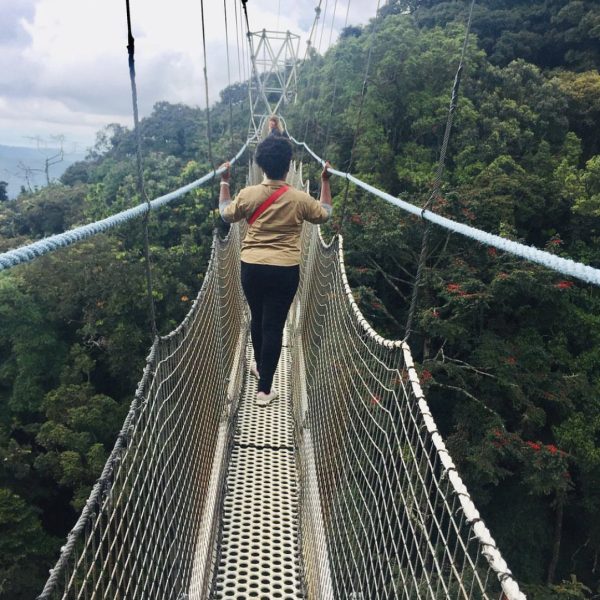
Ritah walking along the suspended Nyungwe canopy walkway
Birding in Nyungwe National Park
For the keen birder and birding enthusiast, birding in Nyungwe is something that can be added to their itinerary aside from chimpanzee tracking. Nyungwe offers great opportunities for bird watching in Rwanda as the park is home to about 322 bird species with 29 Albertine Rift endemics. Bird species to look out for while in Nyungwe include the Shelley’s Crimsonwing, Neumann’s Warbler, Ruwenzori Batis, Dusky Crimsonwing, Archer’s Robin-chat, Grauer’s Warbler, Handsome Francolin, Ruwenzori Nightjar, Regal Sunbird, Blue-headed Sunbird, Albertine Owlet.
Visit the Gisakura Tea Plantation
On the edge of Nyungwe National Park you find tea plantations and these plantations are best visited in the afternoon after your morning activities. The visit to the Gisakura tea plantations is a great way to interact with the locals and spend time learning about tea growing in Rwanda. The visit takes about 1-2 hours and you can take a walk to the plantations from the lodge with your guide. There are opportunities available for one to participate in the tea plantation activities like picking tea and placing it in the basket. After the activity you return to the lodge for overnight.
Colobus Monkey Trekking
The Colobus monkey trekking activity is a great adventure that brings you closer to these beautiful species of monkeys. The monkeys have been habituated under Nyungwe National Park and are available to track by visitors. The large troop of the colobus monkeys is situated on the edge of Nyungwe Forest and are easy to trek so this makes for a less physically demanding activity to engage in while on safari.
Cultural and Community Visit
For a glimpse into the culture of the Rwandan people, one can go on a community visit that involves visiting and interacting with the locals. You can visit the Kitabi cultural village, Banda community village and then for cultural dance performances you visit the Cyamudongo cultural group. Dance is an integral part of the Rwandan culture and its always beautiful getting a glimpse into the beauty and diversity of their cultural dances.
Where to stay in Nyungwe
Visitors to Nyungwe National Park have a range of accommodation options that they can choose from while visiting the park. Nyungwe lodges range from luxury to mid-range to budget. The lodges listed below are located close to the park hence making transfer to starting points for activities easy and stress free. The lodges to consider include;
One and only Nyungwe House – This is a luxury lodge located just outside Nyungwe Forest with stunning views of the Gisakura tea plantations. The lodge is built within a tea plantation and offers the ultimate 5-star safari experience while on safari. One and Only Nyungwe House features en-suite cozy luxury rooms with clean linen and comfortable beds. The lodge also has other amenities and facilities like a state of the art swimming pool, a gym, a dining area offering delicious meals and a comfortable lounge area.
Nyungwe Top View Hotel – The Nyungwe top view hotel is a mid-range facility located on a hill and offering extensive views of Nyungwe from the top. The hotel which was recently renovated features self-contained rooms with colorful African decor, a reception area with an upstairs restaurant that is good for breakfast with a view and a comfortable lounge area for guests to relax after a long day of activities. The hotel is also well situated close to the ranger stations which are starting points for most of the activities in Nyungwe.
EAR Gisakura Guest House – This is a budget accommodation facility that offers the right comfort for the budget traveler. The guest house has both en-suite and non en-suite rooms so one can choose what option works best for them. The rooms feature comfortable and warm linen with wooden beds made by locally sourced furniture. The guest house is located a few minutes away from Gisakura ranger station.
Nyungwe Forest Chimpanzee Tracking Tours
2 Day Rwanda Chimpanzee Tracking Tour
3 Day Nyungwe Chimpanzee Tracking Safari

